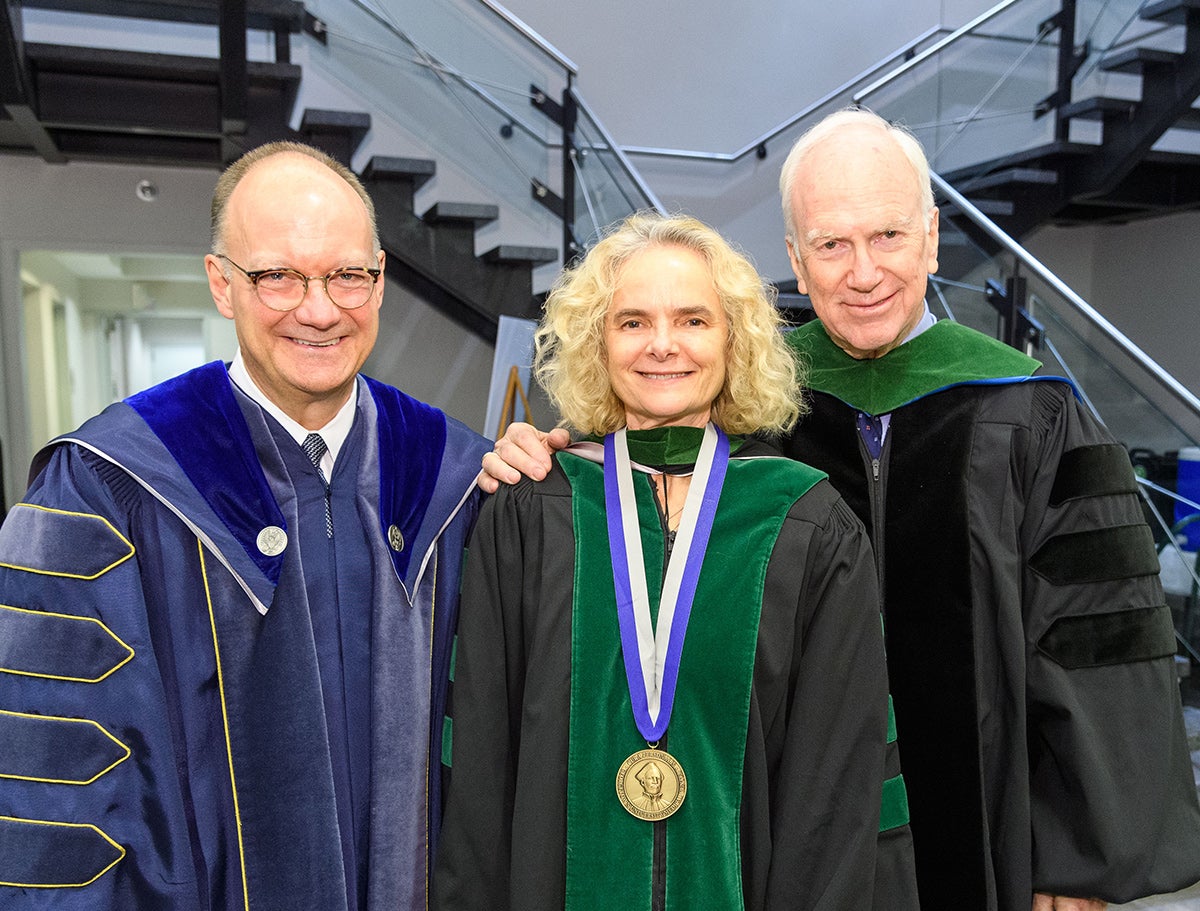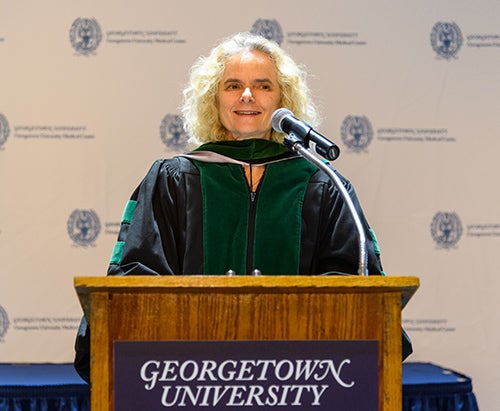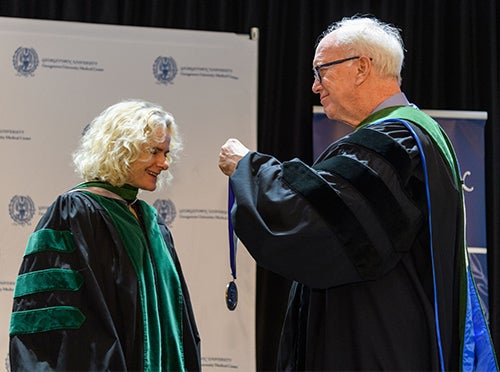GUMC Stories
Experts Explore Causes and Solutions to the Opioid Epidemic
November 20th, 2018

Posted in GUMC Stories | Tagged addiction research, Convocation 2018, university awards
(November 19, 2018) — When asked what led a Mexican-born woman to pursue the study of addiction in the United States, the director of the National Institute on Drug Abuse (NIDA), Nora Volkow, MD, reluctantly credited a tragic history and a family “decimated by intolerance.”
In her keynote address delivered at the 11th Annual Georgetown University Medical Center (GUMC) Convocation on November 13, Volkow carefully explained how the civil war in Spain and the revolution in Russia shaped a family that emphasized personal responsibility for improving the lives of others.
For her scientific contributions and her personal commitment to understanding addiction, GUMC bestowed upon her its highest honor — the Cura Personalis Award.
“I’m very humbled to be recognized with this award because it has been a privilege to actually devote my life to the understanding of one of the most devastating diseases and one of the hardest to understand — addiction,” Volkow began.
Volkow’s recent family history began unlike any other. Her father had been orphaned by the age of 13; his Russian family persecuted by Joseph Stalin. He was sent to Mexico, where he would be raised by his grandfather, Russian revolutionary Leon Trotsky, who had been exiled there years earlier.
Meanwhile, Volkow’s mother was sent along with other children to Mexico as the civil war raged in Spain and the military general Francisco Franco threatened to attack Madrid, where her family lived.
“Having been brought up in a household where our family had been decimated by incapacity to tolerate diverse thinking… my parents instilled in each of [my sisters and me], that each one of us has a responsibility… to do something to improve the lives of others,” she explained.
“To me, this is a great gift.”
Volkow explained, “Medicine became a way that I could do something for others.”
During her medical training, she saw the ravages of addiction — bleeding because of alcohol use; pulmonary cancers in those addicted to smoking.

“What is it that leads a person to take drugs at the expense of their own health, at the expense of their family relationships? Why would someone voluntarily do something to themselves that was so harmful?” she remembers asking.
After reading about a new brain imaging technique (PET scan) in the United States while studying medicine in Mexico, Volkow packed up her curiosity and traveled to New York.
As a psychiatrist and scientist, Volkow pioneered the use of brain imaging to investigate the toxic effects and addictive properties of drugs. Her studies have documented changes in the dopamine system affecting, among others, the functions of frontal brain regions involved with motivation, drive and pleasure, in addiction.
Read more about Dr. Volkow’s pathway to science.
Volkow became director of NIDA in 2003, which supports most of the world’s research on the health aspects of drug abuse and addiction. Her work has been instrumental in establishing that addiction is disease.
But despite her discovery characterizing addiction as a disease, a family secret would reveal a new challenge.
Before she died, her mother revealed that Volkow’s own grandfather had been an alcoholic. She was “stunned” by the news, but also surprised that this information had been kept from her, a recognition that something she had been fighting — stigma — had happened in her own family.
“I felt this couldn’t have happened [in my family]. That’s when I realized that we have failed in our communication [about addiction]. We need to explain how changes in the brain influence behavior,” Volkow explained.
“We have to recognize that our capacity to make decisions is dependent on very specific neuronal circuits [that are] damaged by the use of drugs or that are dysfunctional,” she said.
Volkow characterized overdose, cirrhosis and suicide — outcomes of addiction — as diseases of despair.
“The challenge isn’t that we don’t know how to [address addiction]. The challenge is to integrating all of our effort, and pooling our resources to be able to do it,” she said.
“We can fight [it] if all of us use our capacity and our will to create an environment where we each can help in a way that makes our society a fair one and gives each individual a chance to realize their full potential,” Volkow concluded.
At the conclusion of her keynote address, Georgetown University President John D. DeGioia read the Cura Personalis Award citation:

“For her vision in demonstrating the biological basis of drug addiction through innovative brain imaging, for creatively applying those insights to improve our understanding of other conditions including obesity, ADHD and aging, and for supporting research that will lead to new ways to help individuals, families and communities suffering from drug addiction, Georgetown University Medical Center presents Nora Volkow, MD, with its highest honor, the Cura Personalis Award.”
As the audience rose to their feet, Edward B. Healton, MD, MPH, executive vice president of health sciences, presented the Cura Personalis medal to Volkow.
“Dr. Volkow’s contributions to our special day made this year’s convocation one of our most engaging,” Healton said. “Her commitment to the health and well being of the individual and of the community truly reflects the values and spirit embodied in the Cura Personalis Award she received.
“Because of her scientific discoveries, we recognize addiction as a medical disorder — a paradigm shift that has enabled us to study ways to prevent and treat addiction instead of simply punishing drug users. We’re grateful for her scientific achievements, and for her personal values and commitment to others that underlie her work,” he said.
Karen Teber
GUMC Communications
GUMC Stories
Five Decades Focused on Giving a ‘Voice’ to Children — Locally to Globally
November 17th, 2018